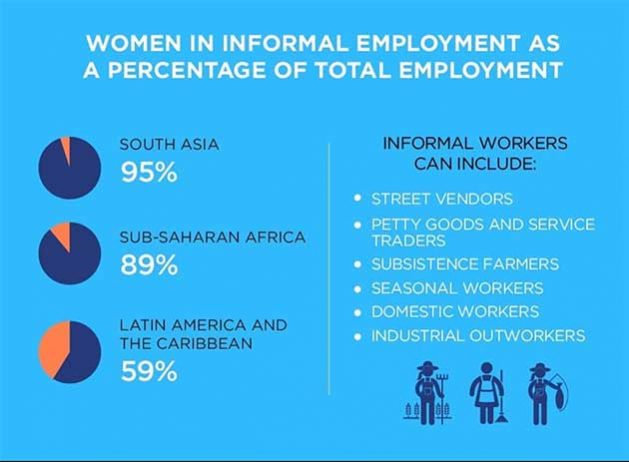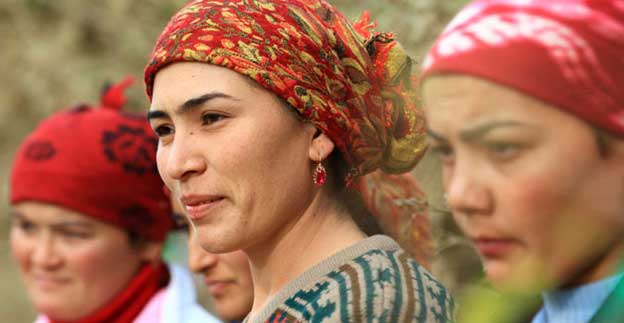A Flawed GDP Bypasses Womens Unpaid Care Work

LONDON, Aug 08 (IPS) - Last week the IMF offered a cautious estimate of positive global economic growth for this year, warning ‘we are on track, but not out of the woods’. But with the IMF and governments continuing to use gross domestic product (GDP) as the dominant measure of economic progress, a more appropriate warning might be that ‘we’ are failing to see the wood for the trees.
As multiple crises wreak havoc across the world, as inequality continues to rise inexorably, as we approach near irreversible climate breakdown, it strains credulity that governments remain fixated on a metric that is incapable of capturing these momentous changes and their profound consequences for our lives.
GDP was developed to measure the monetary value of the marketed goods and services produced in an economy but it rapidly became the predominant measure of national welfare. As such it is flawed.
We should recall the warning issued by Simon Kuznets, founding father of GDP, back in 1934: the welfare of a nation could not, and should not, be inferred from the measurement of its GDP.
GDP is blind to the distribution of the marketed goods and services it measures; it equates progress with growing wealth, even if that wealth is concentrated among a small minority of the world’s population.
It fails to distinguish between market activities that harm people and planet and those that are beneficial. It ignores the value of unpaid care. And it only recognizes natural resources when they can be exploited for profit.

As the feminist economist Marilyn Waring put it, GDP embodies an economic system that counts oil spills and wars as positive contributions to growth but deems the unpaid care of children and families as valueless.
Take the example of unpaid care work, overwhelmingly carried out by women across the world. According to data cited in an Oxfam paper this week, almost two-thirds of women’s weekly working hours – and forty-five percent of the total for all adults – do not enter estimates of GDP because they do not enter the market.
That means nearly 90 billion hours of unpaid care work, without which economic growth would come to a grinding halt, do not count as part of that growth!
History has shown us that fixation on GDP-oriented growth has led to government policies that directly harm women, particularly those at the intersection of multiple inequalities, such as race, class, caste and disability.
This is evident in the consequences of repeated and sustained austerity cuts to public services, here in the UK and elsewhere, including many countries in the Global South. These showed up clearly in the UK during the pandemic.
Cuts in welfare services on which many women depended in order to take up paid work meant that they had to compensate with increased unpaid labour. Cuts to jobs and pay in the public sector where women workers made up most of the work force meant higher rates of female unemployment.
And where public services were retained, as in the health sector, women from poor and minority households made up the majority of frontline workers, were those most exposed to infection.
There are alternative measures of wellbeing to GDP. Some are based on indigenous conceptualizations that stress harmony between people and planet. Others seek to build on common values found across the world: values that stress care and capabilities, culture and leisure, connections with nature and community and, very importantly, democratic participation and social justice.
What these measures all have in common is that GDP is no longer considered the primary goal of national efforts but just one of the means by which shared goals can be achieved.
This proliferation of concepts is indicative of the deep dissatisfaction with GDP on the part of many and the need to go beyond it. They include international organizations like the UN, the OECD and the EU, governments like New Zealand, Canada, Bhutan, Peru, Ecuador as well as numerous networks of activists and academics.
The fact that they have not arrived at an agreed alternative to GDP reflects at least two major challenges. The first is methodological but one that can be resolved through debate and deliberation. Do we want a single, multidimensional index to track how we are doing, more complex than GDP but closer to shared values?
Or should we opt for a dashboard of indicators that allow us to track where we are doing well and where we are falling behind? Should the alternative be nationally determined or internationally?
One argument in favour of an internationalist consensus is the need to factor in ‘the wellbeing elsewhere’ dimension: what we do within one country can have positive or negative repercussions for people in other countries.
The second challenge is political and harder to resolve, as economic elites have been able to capture political power. The richest 1% are not just the wealthiest, they have greatest political clout. They also have strong vested interest in defending a measure of progress that ensures they can legitimately capture the bulk of the wealth generated by markets.
Conversely, those who have most to gain from alternative measures of progress are dispersed and divided - in no small way through the efforts of the 1%. The second challenge therefore is to find a bridge across these divisions and dispersions so that we can collectively engage in the task of revolutionizing the way we think about ourselves in relation to each other and to our planet.
Professor Naila Kabeer is a feminist economist, Department of International Development, London School of Economics (LSE).
https://www.lse.ac.uk/international-development/people/naila-kabeer
IPS UN Bureau
Follow @IPSNewsUNBureau
Follow IPS News UN Bureau on Instagram
© Inter Press Service (2023) — All Rights Reserved. Original source: Inter Press Service
 Global Issues
Global Issues